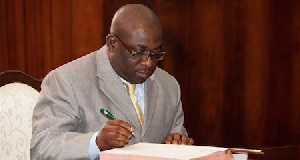- Home - News
- TWI News | TV
- Polls
- Year In Review
- News Archive
- Crime & Punishment
- Politics
- Regional
- Editorial
- Health
- Ghanaians Abroad
- Tabloid
- Africa
- Religion
- Election 2020
- Coronavirus
- News Videos | TV
- Photo Archives
- News Headlines
- Press Release
Business News of Tuesday, 24 May 2016
Source: B&FT
GIFEC must diversify funding sources - Ato Sarpong
Deputy Minister of Communications Ato Sarpong has advised the Ghana Investment Fund for Electronic Communications (GIFEC) to consider alternative sources of funding, as the gains of its financiers, operators in the telecoms sector—are being dwindled by tax obligations and tough market forces.
He said the fund must also improve its impact on local industry and support to government by enhancing access to telecommunications services, providing compelling content for under-served areas, as well as concentrating strongly on research and project impact analysis.
Launching the 10th anniversary celebrations of the fund in Accra, he said: “GIFEC must consider alternative funding options instead of over-relying on the traditional source, which currently accounts for over 98 percent of the fund’s operations.
“Exploring more avenues of funding will help to avoid project stagnation, as gains of the sector players have declined due to tax obligations and other market forces.”
GIFEC, as a universal service fund that is working to bridge the digital divide in the country, is currently funded with one percent of actors’ profits in the telecommunications market—most significantly network operators.
And according to the deputy minister, the operations and planned projects of the fund could risk stagnation in a situation where the margins of telecoms operators are constrained.
Mr. Sarpong indicated that the fund has in its first decade helped to bridge the gap between the served and under-served in the ICT sector, most prominently with its Rural Telephony Project (RTP)—an initiative that has put people in remote parts of the country onto the Internet super-highway.
He added: “GIFEC will have to position more strategically to continue playing its meaningful role toward improving the socio-economic standards of Ghanaians in under-served parts of the country”.
Mr. Sarpong assured that government, on its part, will support the ICT sector and related actors—including GIFEC—with progressive regulations that promote the sector’s growth and productivity in the interest of socio-economic growth.
He charged GIFEC to deliberate with the telcos to come out with a model that will ensure people in remote parts of the country are not taken out of the digital and telecommunication experience, especially at a time low literacy and income levels are pushing telecom operators away from investing in those areas of the country.
Mr. Sarpong, touching on the sector’s contribution to the national economy, said about 10-12 percent of government revenue is generated by the telecoms sector; while mobile network operators in the sector are aggressively pushing the cashless society agenda through provision of mobile-based financial products.
Administrator of GIFEC Kwabena Ofosu Akyeampong described the first ten years of the fund’s operation as “transformative through making electronic communication accessible to the people, especially those on the lower side of the digital divide”.
One flagship achievement, he indicated, was the Rural Telephony Project – “Where we have been able to connect 51 masts that have enabled persons in under-served communities to access phone signals and be able to share in the telecommunications experience”.
Mr. Akyeampong indicated, going forward, the fund will build on its previous achievements in a manner that enhances electronic communication access to all communities across the country; aside from coming out with some commercial projects which generate resources to cushion its operation.
He said: “In the coming years we intend to construct a Satellite Hub that enables us to reach the whole country with our services at the same time. This is one project that can be commercialised with the telcos to generate some revenue.
“Most of the innovations will help GIFEC to raise revenue to support operations and maintenance; we don’t want to compete in the private sector sphere—as in competing with the telcos who fund us to be in existence.”
The 10th anniversary celebrations will be marked with symposia and conferences that discuss the promotion of information communications technology as a key driver of socio-economic transformation.
There will also be a free medical screening for over 300 drivers as a corporate social responsibility act, a lecture on ICT and governance, and an Industry Day for sector actors to network and discuss pertinent industry issues as well as fun games.











